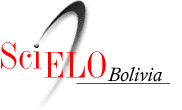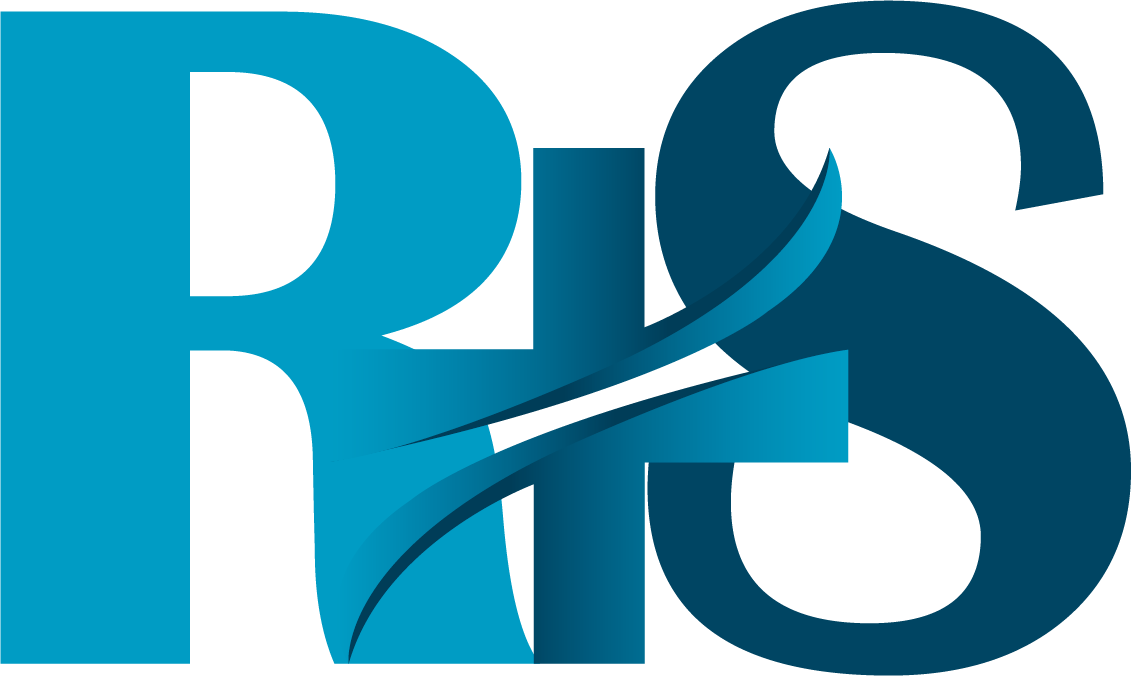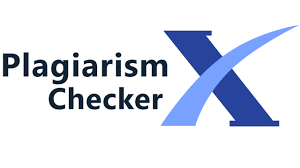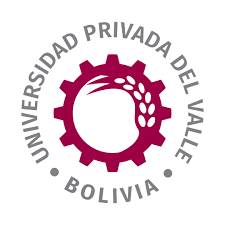Stress, coping, and self-care in female teachers: Impact of COVID-19
DOI:
https://doi.org/10.52428/20756208.v20i48.1255Keywords:
stress, teachers, coping, self-careAbstract
Introduction: In the context of the COVID-19 pandemic, the well-being of teaching staff became especially relevant due to the drastic changes in work and personal dynamics, creating an environment of high emotional demand. Female teachers, in particular, faced a greater overload of responsibilities. The objective of this study was to examine the relationship between stress levels, coping styles, and self-care among female education teachers in Coahuila, Mexico, during the COVID-19 pandemic. Materials and Methods: This was a quantitative, cross-sectional, correlational study conducted with a non-probabilistic convenience sample of 100 female teachers, with a mean age of 36 years (SD = 7,49). Participants reported spending an average of 5,96 hours per day in front of a screen for work-related activities. Two instruments were used: Kenneth M. Nowack’s Stress Profile and the Self-Care Agency Assessment Scale (ASA). Descriptive statistics were calculated, and Pearson correlation coefficients were estimated. Results: The findings show that higher stress levels are associated with a decrease in both self-care behaviors and coping strategies among teachers. Additionally, a positive relationship was found between self-care and the coping styles adopted by the participants. Discussion: Self-care proves to be a key protective factor against stress and plays an essential role in the coping strategies used by teachers. Promoting self-care may significantly contribute to their physical and emotional well-being, particularly in high-demand contexts such as those experienced during the pandemic.
Downloads
References
Organización Mundial de la Salud [OMS]. Brote de enfermedades por coronavirus (COVID-19). OMS [Internet]; 2020 [consultado el 17 de Noviembre de 2024] Disponible en: https://www.who.int/es/emergencies/diseases/novel-coronavirus-2019
Diario Oficial de la Federación. Suspensión de clases en escuelas de educación preescolar, primaria, secundaria, normal y demás. Secretaria de Gobernación [Internet]. 2020 [Consultado el 19 de octubre de 2024]. Disponible en: https://www.dof.gob.mx/nota_detalle.php?codigo=5589479&fecha=16/03/2020#gsc.tab=0
Daniel J. Education and the COVID-19 pandemic. Prospects [Internet]. 2020 [Consultado el 21 de Octubre de 2024]:49(1-2):91-6. Disponible en: https://doi.org/10.1007/s11125-020-09464-3
https://doi.org/10.1007/s11125-020-09464-3
PMid:32313309 PMCid:PMC7167396
Brooks SK, Webster RK, Smith LE, Woodland L, Wessely S, Greenberg N, et al. The psychological impact of quarantine and how to reduce it: rapid review of the evidence. Lancet [Internet]. 2020 [consultado el 15 de mayo de 2024]:395(9):12-20. Disponible en: https://doi.org/10.1016/S0140-6736(20)30460-8
https://doi.org/10.1016/S0140-6736(20)30460-8
PMid:32112714
McIntyre RS, Lee Y. Preventing suicide in the context of the COVID-19 pandemic. World Psychiatry [Internet]. 2020 [consultado el 23 de agosto de 2024]:19(2):250-1. Disponible en: https://doi.org/10.1002/wps.20767
https://doi.org/10.1002/wps.20767
PMid:32394579 PMCid:PMC7214950
Kukreti S, Ahorsu DK, Strong C, Chen IH, Lin CY, Ko NY, et al. Post-traumatic stress disorder in Chinese teachers during covid-19 pandemic: Roles of fear of COVID-19, Nomophobia and psychological distress. Healthcare [Internet]. 2021 [consultado el 10 de mayo de 2024]:9(10):1747. Disponible en: https://doi.org/10.3390/healthcare9101288
https://doi.org/10.3390/healthcare9101288
PMid:34682968 PMCid:PMC8535533
Jakubowski TD, Sitko-Dominik MM. Teachers' mental health during the first two waves of the COVID-19 pandemic in Poland. PLoS One [Internet]. 2021 [consultado el 10 de mayo de 2024]:16(9):1-25. Disponible en: https://doi.org/10.1371/journal.pone.0257252
https://doi.org/10.1371/journal.pone.0257252
PMid:34555049 PMCid:PMC8460021
Ozamiz-Etxebarria N, Mondragon NI, Bueno-Notivol J, Pérez-Moreno M, Santabárbara J. Prevalence of anxiety, depression, and stress among teachers during the COVID-19 pandemic: A rapid systematic review with meta-analysis. Brain Sciences [Internet]. 2021 [consultado el 12 de febrero de 2024]:11(9):1772. Disponible en: https://doi.org/10.3390/brainsci11091172
https://doi.org/10.3390/brainsci11091172
PMid:34573192 PMCid:PMC8468121
Vu CT, Hoang AD, Than VQ, Nguyen MT, Dinh VH, Le QAT, et al. Dataset of Vietnamese teachers' perspectives and perceived support during the COVID-19 pandemic. Data in Brief [Internet]. 2020 [consultado el 21 de febrero de 2024]:31. Disponible en: https://doi.org/10.1016/j.dib.2020.105788
https://doi.org/10.1016/j.dib.2020.105788
PMid:32509940 PMCid:PMC7258812
UNESCO. Education in Latin America and the Caribbean in the second year of the COVID-19 pandemic. [Internet] 2022 [consultado el 22 de mayo del 2025]. Disponible en: https://unesdoc.unesco.org/ark:/48223/pf0000383468
Ali MF, Kundra S, Alam MA, Alam M. Investigating stress, anxiety, social support and sex satisfaction on physical education and sports teachers during the COVID-19 pandemic. Heliyon [Internet]. 2021 [consultado el 15 de mayo de 2024]:7(8):e07860. Disponible en: https://doi.org/10.1016/j.heliyon.2021.e07860
https://doi.org/10.1016/j.heliyon.2021.e07860
PMid:34485739 PMCid:PMC8391050
Zapata-Garibay R, González-Fagoaga JE, Asadi-González AA, Martínez-Alvarado JR, Chavez-Baray SM, Plascencia-López I, et al. Mental health stressors in higher education instructors and students in Mexico during the emergency remote teaching implementation due to COVID-19. Frontiers in Education [Internet]. 2021 [consultado el 25 de agosto de 2024]:6:1-12. Disponible en: https://doi.org/10.3389/feduc.2021.670400
https://doi.org/10.3389/feduc.2021.670400
Orrego V, Rojas-Mata N, González-Arratia NI, Domínguez-Espinosa AC. COVID-19 y salud mental docente: diferencias en torno al sexo y el rol de cuidador(a). Rev Mex Invest Educ [internet]. 2023 [consultado el 24 de mayo de 2025];28(97):587-613. Disponible en: https://www.scielo.org.mx/scielo.php?pid=S1405-66662023000200587&script=sci_arttext
Huang JZ, Han MF, Luo TD, Ren AK, Zhou XP. Encuesta de salud mental de 230 miembros del personal médico en un hospital terciario de enfermedades infecciosas para COVID-19. Chin J Ind Hyg Occup Dis [Internet]. 2020 [consultado el 29 de agosto 2024]:38(3):192-5. Disponible en : https://doi.org/10.3760/cma.j.cn121094-20200219-00063
Hernández-Montaño A, González-Tovar J. Predictores de ansiedad en mujeres con trabajo remunerado. Informes Psicologico [Internet]. 2019 [consultado el 29 de agosto de 2024];19(2), 11-23. Disponible en: http://dx.doi.org/10.18566/infpsic.v19n2a01
https://doi.org/10.18566/infpsic.v19n2a01
Zapata-Garibay R, González-Fagoaga JE, González-Fagoaga CJ, Cauich-García JR, Plascencia-López I. Higher education teaching practices experience in Mexico during the emergency remote teaching implementation due to COVID-19. Frontiers in Education [Internet]. 2021 [consultado el 11 de Marzo de 2024]:6:1-14. Disponible en: https://doi.org/10.3389/feduc.2021.628158
https://doi.org/10.3389/feduc.2021.628158
Jiménez-Sánchez C. Impacto de la Pandemia por SARS-CoV2 sobre la Educación. Rev Electr Educare [Internet]. 2020 [consultado el 14 de febrero de 2024]:24(Suppl), 1-3. Disponible en: https://doi.org/10.15359/ree.24-s.1
https://doi.org/10.15359/ree.24-S.1
Carlotto MS, Câmara S. Perfiles del Síndrome de Burnout entre Profesores. Escritos Psicol [Internet]. 2017 [consultado el 30 de marzo de 2024]:10(3):159-66. Disponible en: https://www.revistas.uma.es/index.php/espsi/article/view/10050
McEwen BS, Akil H. Revisiting the Stress Concept: Implications for Affective Disorders. J Neurosci [Internet]. 2020 [consultado el 39 de abril de 2023];40(1), 12-21. Disponible en: https://doi.org/10.1523/JNEUROSCI.0733-19.2019
https://doi.org/10.1523/JNEUROSCI.0733-19.2019
PMid:31896560 PMCid:PMC6939488
Tobón S, Rojas ACN, Vinaccia S. Diseño de un modelo de intervención psicoterapéutica en el área de la salud a partir del enfoque procesal del estrés. Revista de Estudios Sociales [Internet]. 2004 [consultado el 10 de abril de 2024]:18:59-65. Disponible en: https://doi.org/10.7440/res18.2004.05
https://doi.org/10.7440/res18.2004.05
Lazarus RS, Folkman S. Estrés y procesos cognitivos. Barcelona: Martínez Roca; 1986.
Contreras F, Esguerra G. Psicología positiva: una nueva perspectiva en psicología. Revista Diversitas [Internet]. 2006 [consultado el 27 de noviembre del 2024]:2(2):311-9. Disponible en: https://www.redalyc.org/pdf/679/67920210.pdf
https://doi.org/10.15332/s1794-9998.2006.0002.10
Brissette I, Scheier MF, Carver CS. The role of optimism in social network development, coping and psychological adjustment during a life transition. J Pers Soc Psychol [Internet]. 2002 [consultado el 23 de febrero de 2023]: 82:102-11. Disponible en : http://dx.doi.org/10.1037/0022-3514.82.1.102
https://doi.org/10.1037/0022-3514.82.1.102
PMid:11811628
Orem D. Guides for developing curriculum for the education of practical nurses. Washington (DC): Department of Health, Education, and Welfare; 1959.
Véliz Burgos AL, Dörner Paris AP, Soto Salcedo AG, Arriagada Arriagada A. Bienestar psicológico y burnout en profesionales de atención primaria de salud en la región de Los Lagos, Chile. Acta Univ [Internet]. 2018 [consultado el 12 de abril de 2024]:28(3):56-64. Disponible en: https://doi.org/10.15174/au.2018.1895
https://doi.org/10.15174/au.2018.1895
Ato M, López JJ, Benavente A. A classification system for research designs in psychology. An Psicol [Internet]. 2013 [consultado el 23 de abril de 2024]:29(3):10, 38-59. Disponible en: https://doi.org/10.6018/analesps.29.3.178511
https://doi.org/10.6018/analesps.29.3.178511
Novack KM. Perfil de Estrés. Ciudad de México: Manual Moderno; 2002
De la Roca-Chiapas JM, Pérez V, Huerta-Lépez JE, Acosta-Gómez M, Nowack K, Colunga-Rodríguez C. Validación del Perfil de Estrés de Nowack en estudiantes universitarios mexicanos. Rev Salud Pública [Internet]. 2019 [consultado el 23 de abril de 2024]:21(2):146-53. doi: 10.15446/rsap.v21n2.73864.
https://doi.org/10.15446/rsap.v21n2.73864
PMid:33027322
Evers GCM. Evaluación de la Agencia de Autocuidado: escala ASA. Van Corcum; 1989.
Gallegos E. Validez y confiabilidad de la versión en español de la Escala: valoración de las capacidades de autocuidado. Desarrollo Científico de Enfermería [Internet]. 1998 [consultado el 10 de noviembre de 2024] :6(9):260-6. Disponible en: https://www.scienceopen.com/document?vid=be8e7559-7e02-4ddd-b9f0-e467feaa423e
García-Valenzuela LR, Valtierra-Oba ER, Díaz de León-Castañeda C. Propiedades psicométricas de la Escala de Valoración de la Capacidad de Autocuidado en mujeres mexicanas. Psicología y Salud [Internet]. 2024 [consultado el 28 de marzo de 2024]:35(1):1-21. doi: 10.25009/pys.v35i1.2960.
https://doi.org/10.25009/pys.v35i1.2960
Díaz de León Castañeda C, Valencia Guzmán MJ, Lemus Loeza BM, Martínez Ávila B. Propiedades psicométricas de la Escala de Valoración de la Capacidad de Autocuidado en adolescentes mexicanos. Revista Ciencias de la Salud [Internet]. 2023 [consultado el 14 de abril de 2024]:21(2):1-21. doi: 10.12804/revistas.urosario.edu.co/revsalud/a.10435.
https://doi.org/10.12804/revistas.urosario.edu.co/revsalud/a.10435
Hernández-Montaño A, González-Tovar J. Modelo explicativo del autocuidado, la regulación emocional y el burnout en psicólogas en condición de aislamiento por COVID-19. Acta Colombiana de Psicologia [Internet]. 2022 [consultado el 14 de abril de 2024]:25(2):90-103. Disponible en: https://doi.org/10.14718/ACP.2022.25.2.6
https://doi.org/10.14718/ACP.2022.25.2.6
Rodriguez-Barboza JR. Desempeño laboral y tecnoestrés en la enseñanza virtual de inglés. Rev Docentes 2.0 [Internet]. 2023 [consultado el 22 de mayo del 2025]:16(2):273-80. Disponible en: https://doi.org/10.37843/rted.v16i2.414
https://doi.org/10.37843/rted.v16i2.414
Godínez-Tovar A, Pozos-Radillo BE, Preciado-Serrano ML. Mental workload in Mexican teachers teleworking during COVID-19 pandemic. Acta Universitaria [Internet]. 2023 [consultado el 22 de mayo de 2025]:19;33. Disponible en: https://doi.org/10.15174/au.2023.3734.
https://doi.org/10.15174/au.2023.3734
Minaya Herrera ME, Requena Cabral G, Mamani-Benito O, Apaza Tarqui EE, Landa-Barzola M. Adaptación y carga laboral como predictores de la autoeficacia profesional durante la Pandemia COVID-19 en docentes universitarios peruanos. Electron J Res Educ Psychol [Internet]. 2022 [consultado el 22 de mayo de 2025]:20(56):27-42. https://doi.org/10.25115/ejrep.v20i56.4917
https://doi.org/10.25115/ejrep.v20i56.4917
Barbosa MDM, Garcia LH, Frota AMMC. Childhood & philosophy. Childhood & Philosophy [Internet]. 2021 [consultado el 24 de mayo de 2024]:17(e57915). Disponible en: https://doi.org/10.12957/childphilo.2021
https://doi.org/10.12957/childphilo.2021.57915
Ma K, Liang L, Chutiyami M, Nicoll S, Khaerudin T, Ha XV. COVID-19 pandemic-related anxiety, stress, and depression among teachers: A systematic review and meta-analysis. Work [Internet]. 2022 [consultado el 23 de junio de 2024]:73(1):3-27. Disponible en: https://doi.org/10.3233/WOR-220062
https://doi.org/10.3233/WOR-220062
PMid:35527618
Santiago ISD, Dos Santos EP, Da Silva JA, De Sousa Cavalcante Y, Gonçalves Júnior J, De Souza Costa AR, et al. The impact of the COVID-19 pandemic on the mental health of teachers and its possible risk factors: A systematic review. Int J Environ Res Public Health [Internet]. 2023 [consultado el 12 de junio de 2024]:20(3):1747. Disponible en: https://doi.org/10.3390/ijerph20031747
https://doi.org/10.3390/ijerph20031747
PMid:36767110 PMCid:PMC9914333
Herman KC, Sebastian J, Reinke WM, Huang FL. Predictores individuales y escolares del estrés, el afrontamiento y el bienestar de los maestros durante la pandemia de COVID-19. Psicología Escolar [Internet]. 2021 [consultado el 24 de mayo de 2024]:36(6):483-93. Disponible en: https://doi.org/10.1037/spq0000456
https://doi.org/10.1037/spq0000456
PMid:34766812
Alam MA, Alam M. Investigating stress, anxiety, social support and sex satisfaction on physical education and sports teachers during the COVID-19 pandemic. Heliyon [Internet]. 2021 [consultado el 19 de junio de 2024]:7(8). Disponible en: https://doi.org/10.1016/j.heliyon.2021.e07860
https://doi.org/10.1016/j.heliyon.2021.e07860
PMid:34485739 PMCid:PMC8391050
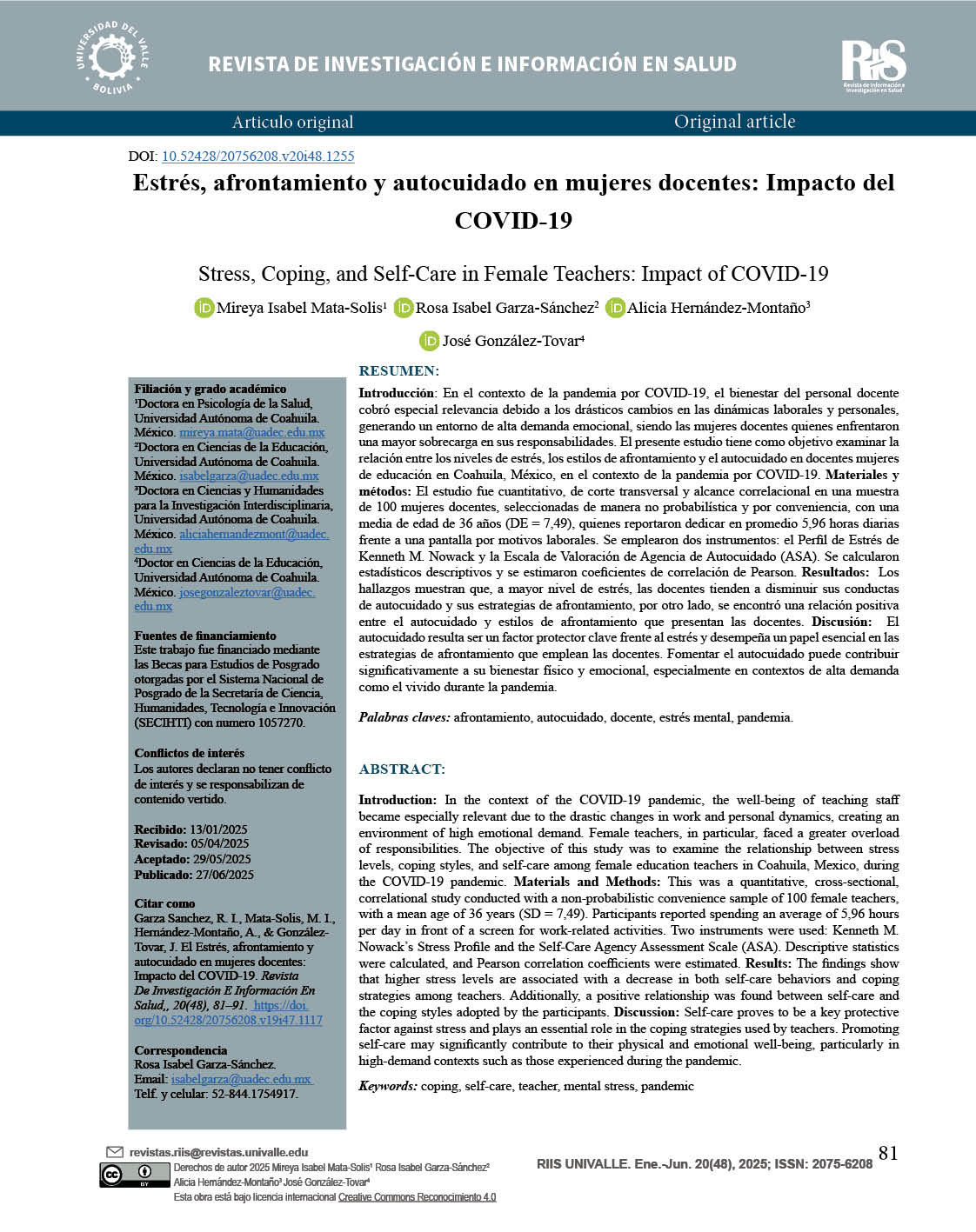
Downloads
Published
How to Cite
Issue
Section
License
Copyright (c) 2025 ROSA ISABEL GARZA SANCHEZ, Mireya Mata, Alicia Hernández-Montaño, Jose González-Tovar

This work is licensed under a Creative Commons Attribution 4.0 International License.
Authors who publish with this journal agree to the following terms:
- Authors retain copyright and grant the journal right of first publication with the work simultaneously licensed under a Creative Commons Attribution License 4.0 that allows others to share the work with an acknowledgement of the work's authorship and initial publication in this journal.
- Authors are able to enter into separate, additional contractual arrangements for the non-exclusive distribution of the journal's published version of the work (e.g., post it to an institutional repository or publish it in a book), with an acknowledgement of its initial publication in this journal.
- Authors are permitted and encouraged to post their work online (e.g., in institutional repositories or on their website) prior to and during the submission process, as it can lead to productive exchanges, as well as earlier and greater citation of published work.







